#its basically the most deliberately romantic subplot in the whole of one piece but it probably won't be ROMANCE SOLVES EVERYTHING
Explore tagged Tumblr posts
Text
Pudding-Kidnapped Plot Significance Theories (interlinked, but each portion could be individually wrong)
1) Blackbeard doesn't know she has a devil fruit, and his purposes for kidnapping her are unrelated to her memory powers. My impression during WCI is that Pudding's devil fruit was VERY secret, and he wouldn't have had an opportunity to learn about it. Plus, if all he wanted was to steal it, he would have done it already. Why bother keeping her prisoner? He's much too practical-minded for that
2) Pudding is going to play a significant role in fixing Sanji's slowly-but-surely progressing Germa-fication. Specifically, I think once Sanji "loses his heart", her slice of his memories from WCI will act as a back-up save of him at Peak Romanticism. Probably not fully curing (since there a lot of other characters that would make for better "remember who you are!!" candidates), but definitely driving in a deep wedge to facilitate it
3) Blackbeard has plans to nullify each Straw Hat member individually, and i bet he's more than noticed Sanji's weaknesses to Women In Danger. So what better woman to leverage against him than the one he was *very publicly engaged* to? (Except he doesn't realize that Sanji's got the Germa-fication thing going on, and so it's not unlikely that this plan will COMPLETELY fall through for very upsetting reasons, assuming Theory Point #2 happens AFTER a Blackbeard Crew fight. Zoro will be trying to fulfill his "kill me" promise at some point, after all)
#been thinking on these for a minute lol#its basically the most deliberately romantic subplot in the whole of one piece but it probably won't be ROMANCE SOLVES EVERYTHING#bc thats just not how this series rolls lmao#i am an apologist and shameless sanpud shipper but i can acknowledge it would fuck with the Themes lmao#one piece theory#charlotte pudding#apology talks
14 notes
·
View notes
Text
The Good Place full series review
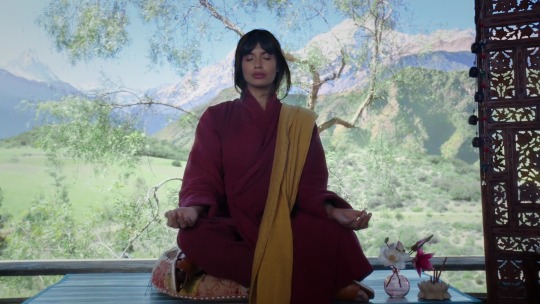
How many episodes pass the Bechdel test?
96% (forty-eight of fifty).
What is the average percentage of female characters with names and lines for the full series?
49%
How many episodes have a cast that is at least 40% female?
Forty-four.
How many episodes have a cast that is at least 50% female?
Twenty-eight.
How many episodes have a cast that is less than 20% female?
Zero.
Positive Content Status:
Good - you might even say, strong - in the sense that it’s all there, pretty much all of the big representation bells are ringing, particularly the ones for women and racial diversity. That said, the show is generally content to sit pretty and not push the envelope on inclusivity, so if you’re looking for inspiration in-text instead of just in casting, you might be disappointed. At any rate, it’s a solid feel-good time, and not likely to make you mad (average rating of 3.01).
Which season had the best representation statistics overall?
The numbers stay pretty consistent across the whole series, but if I had to call a winner, it’s season four, which has the highest percentage of female characters and the only above-average positive content rating (though that was awarded somewhat cumulatively, and so doesn’t feel particularly well-earned by that season above the others).
Which season had the worst representation statistics overall?
It’s such a close call, but season three must be the loser here by virtue of the lowest ratio of female to male characters; it also had one of the series’ two Bechdel fails. Like I said, it’s...a really close call.
Overall Series Quality:
There’s so much about it that is fresh and original and interesting, I wish I could love it more. After a magnificent debut season, the show suffers immensely for a lack of pacing and the absence of coherently-planned plot, and at times the stagnating characterisation and pointless filler caked into the cracks in the storytelling can be frustrating and/or tedious. I’m only as disappointed as I am because the potential for greatness was so strong. That said, even at it’s worst The Good Place is still entertaining, and most of it is better than that. It’s irreverent, it’s fun, it’s surprising, and sometimes it’s even as poignant as it is remarkable. I have my gripes, in droves, but that doesn’t mean this show is not worthy.
MORE INFO (and potential spoilers) under the cut:
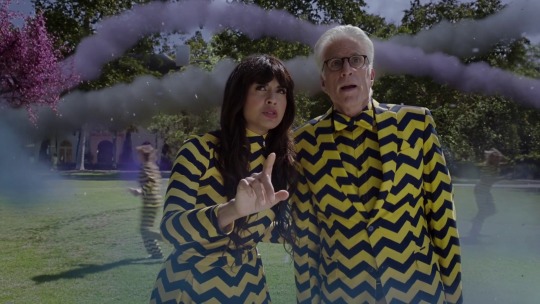
Imagine. Imagine a version of this show where the first season is basically the same, and the second season is...somewhat similar to how it is, but with more focus and direction, less time-wasting; a second season where figuring out that some fundamental change to their circumstances is necessary comes early, and instead of faffing about with ethical lessons in the fake neighbourhood again while Michael pretends he can get everyone to the Good Place, we get down to business with going on the run and into the Bad Place to find the judge and petition for help. Imagine this show, but the third season has none of that return to Earth crap, and instead, is the neighbourhood experiment from season four, properly fleshed out. And then season four is all about going to the Good Place and solving the problems there, addressing issues with the concept of utopia and the ineffectual bureaucracy of obsessive niceness (used for comedic effect in the actual show, but c’mon, there’s a whole untapped reservoir about morality there). Each season could have (gasp!) a properly-planned and plotted arc, dealing with a different school of ethical considerations, and I dunno, maybe the characterisation could have trajectory too, and the characters could vitally shape the storytelling, and maybe not get their personalities and experiences erased and rebooted over and over again, nullifying large swathes of the narrative which came before? Ideally, they could be reset zero (0) times, or at least have all their reboot experiences dumped back into them in the first few episodes of season two, so that they could proceed from there as whole people. Rebooting everyone’s personalities is not actually necessary to the plot in any way, and is, actually, incredibly detrimental to storytelling and especially, character development. Imagine this show, but just chilling out and actually telling a coherent story?
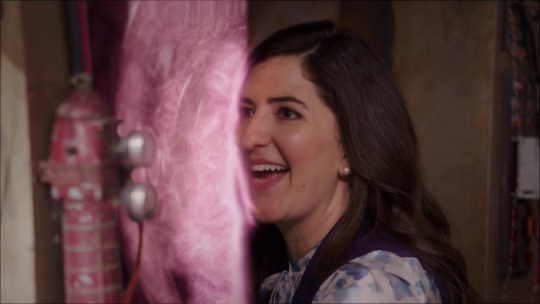
I am all the more annoyed by how things turned out on this show because I know that the four seasons were planned for, rather than being the result of cancellation; the idea that the creators sat down and ‘plotted’ (using that term loosely) to make this mess drives me a little wild. The (attempted) avoidance of the dreaded ‘stagnation’ seems obvious, and it leads to major narrative shortcuts and jumps and instances where the show spends an episode or two on what should have been a half-season’s development, minimum, and yet at other times all momentum grinds to a halt for a bizarre bottle-type episode where the characters just talk about a concept for a while or work on some unimportant romantic subplot. The various ethical concepts that the show heavily incorporated as its bread and butter in the first season start to stick out like sore thumbs in season two, seemingly wedged into one episode or another for no real reason other than just to be there, and the fact that the show lets go of the idea of moral choices in the life mattering at all in the end leaves the backbone of the show in a very strange shape. I said in the season four review that I didn’t expect the show to come up with some One True Answer about how people should live their lives, but that I was baffled by the fact that the show side-stepped that altogether; what I expected them to conclude was something in the line of ‘we recognise that life is complicated, not all situations are created equal, and it can be hard to know how to proceed ethically or even to access ethical options within one’s circumstances. Still, it is important to do your best, not only for yourself but for your community, because the more good you put into the world, the more there will be to go around and come back to you. What matters most is that you are doing your best with what you’ve got’. The fact that the show distracted itself with fixing how the afterlife rewards people within the afterlife means that it suggests no incentive to perform moral actions in life, and frankly...who gives a fuck? The real world is the place we’re all living in, and there’s no point starting a conversation about morality in real life if the conclusion is just ‘guess we’ll straighten out all the fascists and bigots and the other pieces of shit after they die, so don’t worry, everyone gets to Heaven eventually!’
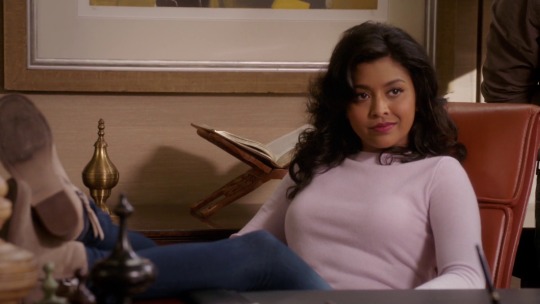
Anyway, if that seems like just a reiteration of what I said in the season four review, well. I’m still baffled by it. The other thing I was going to talk about in the season four review but held for the full series instead was that one big thing that I have railed about all the time since season one, and that’s PACING. For all ye wannabe-writers out there, please understand how important pacing is. Even vital plot or character beats can seem like meaningless filler in a poorly-paced story, because your audience’s mind is hardwired to try and follow narrative cues that are being incomprehensibly muddled. Standard structure can be played with, but if you toss it out in favour of ‘stuff just happens, ok? Except when it doesn’t’, you just end up with a soup of disconnected story ideas, and nothing threading it together. Character interactions and especially developments can help to create the through-line you need to keep the story functioning despite itself, but as variously noted with The Good Place...initial characterisation? Strong, excellent. Development? Not so much, not least because they kept getting deleted and rebooted. Also, time skips kept happening, and that’s a great way to fuck over your narrative coherence even more: remove the recognisable constant we call time! It’ll be fine! As with all things, it is perfectly possible to play around with this stuff, but you have to know what you’re doing and be doing it for a good reason, and that’s not what they had going on here. This was narrative soup, and when you have a soup, the pieces all kinda meld together and lose any individual purpose, meaning, or power they may have had. The result in this case was not bad, but it really could have been so much better, and literally all it needed for that was some attention being paid to the story structure via pacing.
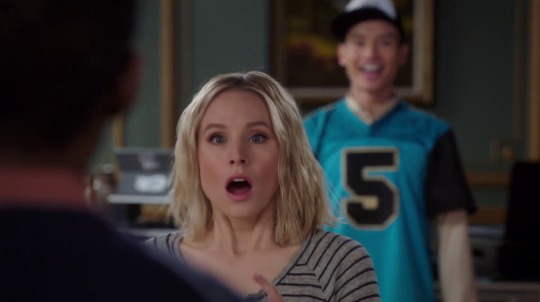
So. The good news is, I think I have pretty well exhausted all of my complaints by now, and that leaves us with the good stuff, of which there was no paltry amount. The show was not a hit by accident (even if I do feel that it’s success had a lot to do with people sticking around after the spectacular first season, and not because it stayed strong throughout), and even if there was a lot of soup going on, what comprised that soup was all really fun and unique, and this made for a wonderful piece of light-hearted television that could be as hilarious as it was insightful. It still had a lot of great takes on things, the commentary was strong (even if it pulled all its punches towards the end), and whether the storytelling was ebbing or flowing, it was always delightful. The show also managed to pull a miraculous finale out of its hat, and that’s a rare thing in television; however the story wobbled over the course, the ending provided enough satisfaction to forgive just about any sins, especially if you don’t happen to have been watching with a deliberately critical eye. Do I wish that Eleanor got to hook up with a chick on-screen some time instead of just making a lot of bi remarks? Yes. Do I consider the show to have queerbaited instead of providing genuine rep? No. Is the underselling of the queer content my most significant representation complaint? Yes, it is, and that's good news considering the world we live in and the dearth of quality representation that the industry has brought us to expect.
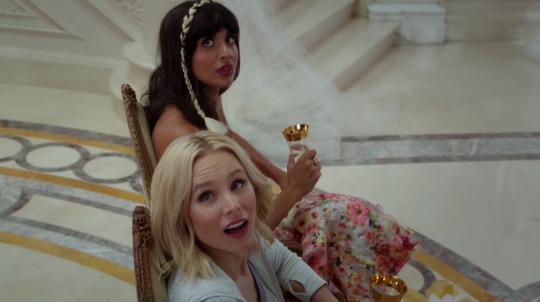
There's an important distinction to be made there, regarding the tokenistic representation that is very common these days in tv trying for brownie points and good publicity, exactly that kind of 'political' inclusivity that conservatives are always bitching about. It should not be surprising that I support that tokenism over the alternative of having no representation at all, but it can still be quite disheartening to feel like your identity or the identities that you value are being referenced as nothing more than an opportunity for some shitty producer to perform wokeness for attention, praise, and the almighty dollar. I bring this up because - even though The Good Place never really worked up much of a boost to its content rating - one thing I felt that it did really, really right was providing representation without it feeling tokenistic at all. Eleanor's bisexuality wasn't as prominent as I might have preferred, and as noted through the course of the show, there were times I feared it was more bait than real rep, but reflecting on it at the end, the way it was included feels organic, it never gets in the way in order to ensure the audience notices and is dutifully impressed. The number of women around and the multicoloured casting plays out even better; I never once felt cynical about the gender balance I was seeing, and I've said it before but I'll say it again: the fact that the show was packed with names from across the world gives me so much life. I'm still a little salty about Chidi's Senegalese origins getting the shaft (and we won't talk about 'Australia'), but the nonchalant diversity of naming goes such a long way to embracing the idea that this is a world for everyone (and an afterlife for everyone, too). And where anything else might fall apart or lose its way, that is an affirming thing. If you want feel-good tv, it’s here. This is the Good Place.
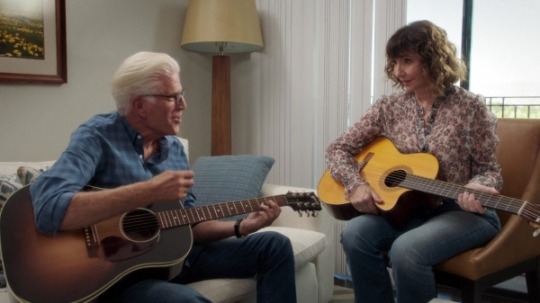
9 notes
·
View notes